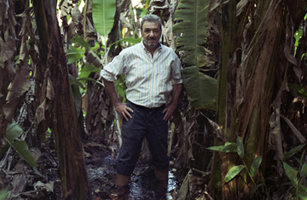
Negotiations over how to deal with climate change have long been complicated by differences between the rich north and the poor south. Some of the fiercest arguments have come over greenhouse gases emitted when forests in the developing world are burned or logged. Rich countries want developing nations to leave their forests untouched. The developing world argues that this will limit economic growth and since most of the carbon in the atmosphere has come from the developed world, rich countries, not poor ones, should bear the costs of carbon reduction.
Enter Marcio Santilli, philosophy graduate, longtime indigenous-rights activist and, when first elected in 1982, Brazil's second youngest ever Congressman. Santilli, 53, has spent much of his life shuttling between the Amazon and Brasília, the capital, and knows the needs of both forest peoples and politicians. Why, he asked in 2003, can't poor countries be rewarded for reducing their rates of deforestation?
The idea changed the game. Tropical deforestation accounts for around a fifth of annual greenhouse-gas emissions and is the largest source of emissions in the developing world. But forestry projects were not eligible for financing under the Kyoto Protocol, which made it hard for developing nations to get international funding for any efforts they might make to slow deforestation.
Santilli reasoned that nations that reduce their rate of deforestation below their historical average should be eligible for compensation through emission allowances that can be traded on the carbon market. The compensation would come after 2012 and only when reductions are confirmed using satellite imagery.
The plan was so radical that at first both sides had trouble accepting it. Greenpeace was angered by the thought that multinationals might pay developing nations to compensate them for not cutting down forests; some of its activists stole the presentation packs from a climate conference to stop delegates hearing about the idea. The Brazilian government — always sensitive to issues of national sovereignty — balked at the notion of rich nations offering developing ones rewards.
But the idea, known as "compensated reduction," has gained traction and has proved pivotal. "For the first time it is possible that tropical forest may be worth more alive than dead," says Steve Schwartzman, tropical-forest director at the Environmental Defense Fund in Washington, D.C., and a longtime friend of Santilli's. "Marcio is responsible for that."
Santilli, a humble man whose lack of English has stopped him from becoming better known outside Brazil, is reluctant to take the credit. But he knows that time is running out and that creative solutions are key. "I believe that we will reach an accord in Copenhagen [at December's climate-change conference] based on satisfactory long-term goals and unsatisfactory short-term goals," he says. "We know from experience that it is much harder to recover lost forest than it is to protect existing forest. So we need to take action now."